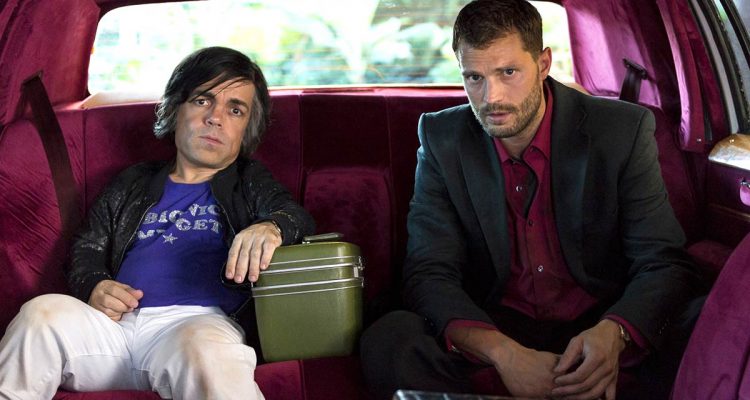As a journalist, there are certain interviews that are a capital E, experience, and make an indelible impact on you long after they’re done. Such was the case for a young, pre-filmmaking Sacha Gervasi with renowned diminutive actor Hervé Villechaize of “The Man with the Golden Gun” and “Fantasy Island” fame who conducted an epic, days-long interview with a very candid Villechaize in the later years of his life. One could say both Gervasi and Villechaize were troubled enigmas, brought together by some cosmic twist of fate, if one subscribes to such a notion. Some 25 years later, Gervasi, screenwriter of “The Terminal,” and director of the metal documentary, “Anvil: The Story of Anvil,” has skillfully recreated his entire interview with the actor, the good, the bad, and the ugly, in “My Dinner with Hervé” which premiered earlier this year on HBO.
Fresh off of his Primetime Emmy nomination for Outstanding Television Movie, which he shares with Peter Dinklage (who plays Villechaize) and co-producer/legendary screenwriter Steven Zaillian (“Gangs of New York“), Gervasi spoke to me about the long odyssey to get “My Dinner with Hervé” made, Dinklage and Zaillian’s integral roles in the production, balancing CGI with practical effects, Jamie Dornan‘s acting chops, “The Terminal,” and more.
What compelled you to recreate this interview you conducted with Hervé after 25 years?
I felt like I had to tell the story because the magazine I was writing for at the time had published a version of all of the best parts of that, the heart and soul had been stripped out. I felt the actual encounter I had with Hervé, this personal side was missing from the article that was ultimately published. I had to really tell the story of our encounter and also tell the story who Hervé really was. There were many, many aspects, his personality, often quite contradictory. But there was an incredible heart there and an incredible warmth as well as the madness and the crazy anger and insanity [laughter].
And I just felt like that no one really understood that. People just saw him as a one-note joke, in a way. And he was not even real. And I wanted to tell the story of someone who was not a joke, who had so many more dimensions than people saw. I wanted to give the audience the experience I had, which was to walk in with a very fixed, almost very judgmental view of someone, and then to have that just so completely blown apart by the actual experience of meeting him. We’re so anxious to put people in boxes. And the reality is Hervé, like many other people, fits in several boxes. There’s a certain facile way that society wants to view things in those sort of simple binary terms. They’re a good person, they’re a bad person, they’re a short person, they’re a tall person, they’re a dangerous person, they’re a charming person.
How did Steve Zaillian help “My Dinner With Hervé?”
Steve, our producer and the incredibly esteemed screenwriter, was involved right from the beginning. Steve read the short script before I went to UCLA film school. I met him at a dinner in LA. He was extremely cool. I didn’t know who he was at first. And then I sent him my script and didn’t hear anything at all and I thought, “Oh my god.” It was like meeting Mick Jagger and you give him your demo tape [laughter].
Steve eventually called and he said, “I’ve been busy. I think the script is potentially great.” And then we met. And eventually, he said, “This is a feature film and you should direct it one day. This is going to be something special.” And that was in 1998 [laughter]. That was more than 20 years ago. Steve was the first person who said, “You can do this. This movie is special, and I want to help you get it made.” And he was just an extraordinary help reading drafts and coming out with comments and really helping us with HBO, making sure it was done right.
Was Peter always in mind to play Hervé?
Yes. Peter was involved from the very start. At that point, when I’d written the short script. Peter and I had met. And we had intended to make this epic short movie called “My Dinner with Hervé” about this encounter between a journalist and Hervé Villechaize. We met right after “The Station Agent,” and we had been talking about it, and then it became clear fairly soon on that no one was going to make a $2 million short film about Hervé Villechaize. And when I turned it into a feature, it became clear that no one was going to make a $10 million feature-length film about [him]. Peter and I took several meetings, and one studio head said, “You’ve come up with the single most uncommercial concept in the history of filmmaking: a suicidal midget movie told over five decades. Just pack up your things and go do other movies.” And then “Game of Thrones” happened [laughter].
I’m incredibly lucky because Peter was involved through the short, through the feature, through every incarnation of the script. He was the only person I thought could do it. And what really sealed it for me was in 2006, I went to see Pete play Richard III at the Public Theater in New York. He just blew the doors off the building with that performance. It was so extraordinary. And then he hung in with us, and we hung in with him. And like I said, the idea of a dwarf actor starring in a film by the time “Game of Thrones” had really started to come to the fore as one of the biggest shows ever on TV suddenly meant that it was no longer this unmake-able, uncommercial prospect. And Peter and Steve are the reason that it got made.

